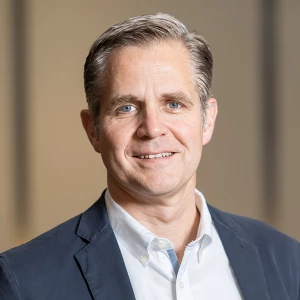Volatile markets, challenging consumer demands, and the technological disruptions resulting from digitization and Industry 4.0 are producing unprecedented rates of change. In response, companies have worked to increase organizational agility, hoping to foster innovation and shorten go-to market cycles. Yet organizational experiences and sociological conditioning often impede true agility. As a result, many of these efforts fall short of their objective to manage the uncertainty generated by change. But another movement—mindfulness—will help companies overcome these challenges.
Mindfulness is a centuries-old idea that has been reinvented to address the challenges of our digital age. In essence, mindfulness describes a state of being present in the moment and leaving behind one’s tendency to judge. It allows one to pause amid the constant inflow of stimuli and consciously decide how to act, rather than react reflexively with ingrained behavior patterns. Mindfulness, therefore, is perfectly suited to counterbalance the digital-age challenges of information overload and constant distraction.
The benefits of mindfulness are both clear and proven. Mindfulness programs help leaders and employees reflect effectively, focus sharply on the task at hand, master peak levels of stress, and recharge quickly. On an organizational level, mindfulness reduces sick days, increases trust in leadership, and boosts employee engagement. What’s more, mindfulness helps to unlock the full potential of digital and agile transformations. New processes and structures are just the starting points for these transformations.
Not surprisingly, interest in mindfulness is growing, especially among digital natives: in the past decade, the rate of increase in Google searches for mindfulness has outpaced that of all Google searches by a factor of four. Furthermore, years of scientific research and modern forms of teaching have fueled its popularity. Now, mindfulness apps even come preinstalled on smartphones and tablets.
Yet integrating mindfulness in the corporate context can be challenging. Some companies encounter vocal skeptics; others struggle with entrenched ways of working. Even leaders and employees who are eager to try out mindfulness find it hard to get started. To unleash the power of mindfulness, companies will have to embrace a holistic approach to corporate agility.
Agility Requires Coping with Uncertainty
To support their agility efforts, many companies have applied “cosmetic” digital-age solutions, such as hackathons, agile meetings (for example, short daily standup meetings to discuss progress and obstacles), and new visualization techniques and creativity tools.
However, most companies have not yet created an environment that truly prepares them to reap the rewards of agility. Often, their ways of working have been shaped by a tradition of emphasizing functional excellence over agility, as well as systems that favor expertise over open-mindedness. Two inhibitors stand out:
- Resistance to Change. As the pace of change increases, employees will have to continuously adapt to evolving circumstances. In most organizations, however, the existing ways of working leave employees unprepared to do so. They may therefore respond with reflexive resistance, a defense mechanism to avoid the discomfort of psychological uncertainty. Organizational politics and poor communication about the purpose of making changes only strengthen this resistance.
- Overvaluing Expertise. Many employees think and interact at work by applying expertise that they gained before the digital age, when efficiency, not agility, was the overarching objective. Such an approach encourages closed-mindedness.
To overcome these inhibitors, leaders and employees need to abandon traditional management styles and linear ways of working. They must rewire their established mindsets, cultivating the open-mindedness and clarity required to navigate through unpredictable environments. They must acknowledge that their business involves elements beyond their control and develop the capacity for self-leadership in an unpredictable environment. And to gain mastery over uncertainty, they must learn to walk in the fog, open their eyes wide to detect signals from all directions, and feel empowered to trigger rapid action.
Mindfulness Facilitates Navigation Through Uncertainty
Mindfulness enables people to radically strengthen their ability to adapt quickly to evolving circumstances and ambiguous situations and to increase the speed with which they learn new things. It creates mental agility and helps people look inward to find answers.
In their recent book, Altered Traits, Daniel Goleman, a Harvard psychologist, and Richard Davidson, a neuroscientist at the University of Wisconsin-Madison, provide a scientific view of personal mindfulness benefits. They synthesize three proven benefits of mindfulness that, in combination, allow people to act more effectively in unpredictable environments:
- Staying Calm and Open-Minded. Mindfulness practices, such as breathing meditation, are associated with decreased gray-matter density in the amygdala, the region of the brain that initiates a response to stress. This reduces the inclination to interpret an uncertain environment as a threat and thus react defensively. In this way, mindfulness improves mental agility, allowing attitudes to shift from “But we have always done it like that” to “Let’s see what happens if we try a new approach.”
- Cognitive Ability. Mindfulness improves short-term memory and the ability to perform complex cognitive tasks. It also frees people to think outside the box, which helps them cut through complexity. In the context of workplace performance, proven results include a higher quality of strategic decision making and more effective collaboration.
- Focus and Clarity of Thinking. As Nobel laureate Herbert A. Simon observed, “a wealth of information creates a poverty of attention.” This insight, first articulated in 1971, is more accurate today than ever before. Maintaining a strong focus in this time of digital information overload, therefore, is essential. The regular practice of mindfulness routines can reduce mental wandering and distractibility. Mindfulness strengthens the awareness of both one’s activities in the present moment and one’s mental processes and behaviors (known as meta-awareness).
By delivering these individual benefits, mindfulness boosts the potential of corporate agility initiatives and agile transformations. It helps people to inspect and adapt their behaviors in short cycles, relax so that they can rewire established attitudes, and think clearly in the midst of overwhelming digital stimuli. In short, mindfulness facilitates navigation in the context of uncertainty and ambiguity.
The Corporate World Has Taken Notice
East Asian corporations, such as Panasonic and Toyota, have long understood that the personal benefits of mindfulness can support business objectives. Indeed, mindfulness is the “zen” in kaizen, the lean-management concept of continuous improvement. Zen, one form of mindfulness, emphasizes deep insight through observation over know-how. It is about discarding preconceptions and developing fresh ideas to achieve continuous self-improvement.
For example, open mindedness through Zen underlies Toyota’s employee suggestion system and quality circles. The quality circles empower employees to adopt a “beginner’s mind” when observing work-related problems and to independently develop innovative measures to drive improvement. Unlike self-perceived expertise, which encourages closed-mindedness, a beginner’s mind is open and curious, with no preconceptions. The more quickly change occurs, the more employees need to adopt a beginner’s mind for problem solving.
A leading pioneer of corporate mindfulness is Jon Kabat-Zinn, who facilitated its democratization by designing a program called Mindfulness-Based Stress Reduction. The course provides a simple and structured introduction to scientifically proven meditation practices. Similarly, Chade-Meng Tan has developed Search Inside Yourself, a course that combines meditation practices with emotional intelligence training—an approach he pioneered at Google.
More recently, companies in the West have turned to mindfulness to promote employee well-being and productivity. The movement began among startups in Silicon Valley and has been implemented by long-established companies across the US and Europe as well as by government bodies. These include Aetna, Beiersdorf, Bosch, General Mills, Goldman Sachs, Intel, Royal Dutch Shell, SAP, Target, the UK’s Parliament, and the US House of Representatives.
Many of these organizations embrace agility and aspire to cultivate a new form of leadership. Among the top executives who meditate and encourage their employees to follow their example, for instance, are Salesforce CEO Marc Benioff, Twitter CEO Jack Dorsey, and Google cofounder Sergey Brin. In fact, attending a meditation class is a popular way to begin the workday at many Silicon Valley companies, including Apple, Facebook, LinkedIn, and Twitter.
Over the course of many years, Bosch, a multinational engineering company that focuses on automotive components and consumer goods, has increased its agility through a variety of initiatives. These include creating flexible organizational structures, introducing agile development methods, and experimenting with new business models and technologies. In order to promote the success of these initiatives, the company realized that it needed to fundamentally change its approach to leadership. According to Petra Martin, who is responsible for leadership development at Bosch Automotive Electronics, “Mindfulness is an essential lever to shift from a culture of control to a culture of trust. Communication has fundamentally changed since we introduced our mindfulness training to more than 1,000 leaders in the organization.”
At software company SAP, mindfulness has become a key ingredient of corporate life for employees and executives alike. More than 6,000 employees have taken two-day mindfulness courses that focus on meditations complemented by the practice of self-mastery and compassion. In addition, internal mindfulness trainers offer guided meditations during working hours and a multiweek mindfulness challenge, including meditation “micropractices,” such as tuning out of a busy workday for a few minutes to focus on one’s breathing. “For many managers, it has become the new normal to open meetings with short meditations,” says Peter Bostelmann, the director of SAP’s global mindfulness practice. Participants in the mindfulness program report increased well-being and higher creativity. What’s more, mindfulness has promoted significant measurable improvements in employee engagement and leadership trust indices. Bostelmann has seen a significant shift in how corporate mindfulness programs are perceived. A few years ago, some leaders ridiculed the concept of mindfulness at work. Recently, however, executives of other companies—including Deutsche Telekom and Siemens—have sought Bostelmann’s advice about how to adopt mindfulness concepts at their companies.
Aetna, a US health insurer, has trained 13,000 employees on mindfulness practices, resulting in a reported reduction in stress levels of 28%. Annual productivity improvements, a secondary effect, are estimated at $3,000 per employee. Aetna launched the mindfulness initiatives gradually, starting with brief meditations in executive-team meetings and then continuing with yoga and meditation classes for all employees. “We have demonstrated that mindfulness-based programs can reduce stress and improve people’s health,” says Mark Bertolini, Aetna’s chairman and CEO.
How Companies Can Instill Mindfulness
To fully capture the benefits of mindfulness, companies should customize their mindfulness programs. While it is valuable to begin by determining the objective of mindfulness interventions, many organizations have also achieved good results by starting with a small pilot program, such as providing a mindfulness course to senior leadership.
For some companies, mindfulness will become a paradigm for organization design and employee well-being. In terms of adopting mindfulness generally, organizations can start by experimenting with four types of interventions: leadership training, meditation training, mindfulness micropractices, and mindfulness coaching.
Leadership Training. As management guru Peter F. Drucker observed, leaders need trained perception fully as much as analysis. Well-designed leadership courses address this need by combining actionable mindfulness and emotional intelligence practices.
Even customized mindfulness leadership courses share common elements. Leaders should learn how to integrate formal and informal mindfulness practices into everyday life. Formal practices are often guided meditations, while informal practices include mindful listening exercises and simply paying attention to the task at hand.
By instilling self-awareness, self-regulation, and compassion, mindfulness courses address the psychological root causes of multiple leadership challenges. And because these courses also encourage the natural development of skills for managing time, change, and conflict, training programs dedicated to establishing these skills might become obsolete.
At Bosch, a one-year agile leadership-training curriculum involves three modules: leading oneself, leading teams, and leading the organization. The self-leadership training focuses on mindfulness and involves regular guided meditations, conscious-communication exercises, and courses to help leaders avoid the pitfalls of multitasking.
At a multinational engineering company, some leaders openly expressed skepticism about the value of mindfulness. The company converted these skeptics into believers by explaining the concept in layman’s terms, sharing scientific research about its effectiveness, and inspiring senior leaders to become change agents. Today, mindfulness is the new normal for the company, and leaders pause for meditation in the designated silent room before making major decisions or having difficult discussions.
Meditation Training. In addition to training executives, organizations should evaluate whether to offer training opportunities to all employees. Many individuals are willing to try out meditation but struggle to understand where to start. A half-day to full-day course can introduce basic practices, such as breathing or body scan meditations, so that employees can subsequently continue on their own.
To reinforce their training courses, some organizations—including Google, LinkedIn, and Twitter—offer guided meditations during working hours. Google has also established silent lunches and silent rooms, where employees can go to readjust their mindsets in the midst of an intense working day.
Mindfulness Micropractices. Repetitive practice of basic skills is essential to promote mastery: think of pianists playing scales throughout their careers or baseball players taking batting practice before every game. Similarly, employees who complete a meditation program need to continue practicing, through micropractices, to truly master mindfulness. Seasoned meditators report transformative mindfulness benefits once they have mastered the seamless integration of mindfulness practices into everyday life.
Organizations should invest in creating a culture in which meditation micropractices are not just tolerated but are actively disseminated by mindfulness change agents. Small workshops can also help to integrate mindfulness in a nonintrusive way. These workshops can teach approaches such as Elisha Goldstein’s STOP practice, in which participants learn to stop, take a breath, observe (thoughts, feelings, and emotions), and proceed. Beyond promoting mastery for mindfulness practitioners, micropractices can serve as an easy starting point for skeptics, who often experience surprising benefits after a few sessions.
Mindfulness Coaching. The principles of mindfulness can also help teams collaborate more effectively. For example, if team members master the ability to listen to one another with undivided attention and without interruption, they promote freer and more creative thinking. And a team culture that values appreciation over criticism helps to build transparency and openness. In her 2015 book, More Time to Think: The Power of Independent Thinking, Nancy Kline proposes that people offer appreciative comments five times as often as they do critical remarks.
Facilitation by a coach is essential to capture the benefits of mindfulness in teamwork. Agile teams typically already have scrum masters or agile coaches, and these individuals can become mindfulness coaches as well. Similarly, executive teams could benefit from mindfulness coaches to enable authentic communication and effective teamwork.
Unleashing the Power
Companies that undergo a transformation through mindfulness are seeing positive returns both on an individual level and on an organizational level. As leaders and employees develop the open-mindedness and clarity required to navigate through unpredictable environments, the organization becomes well positioned to unlock the full potential of agility. For companies that have not yet successfully embraced mindfulness, the imperative is clear: follow a well-designed, holistic approach to implement this centuries-old solution to digital-age challenges.









